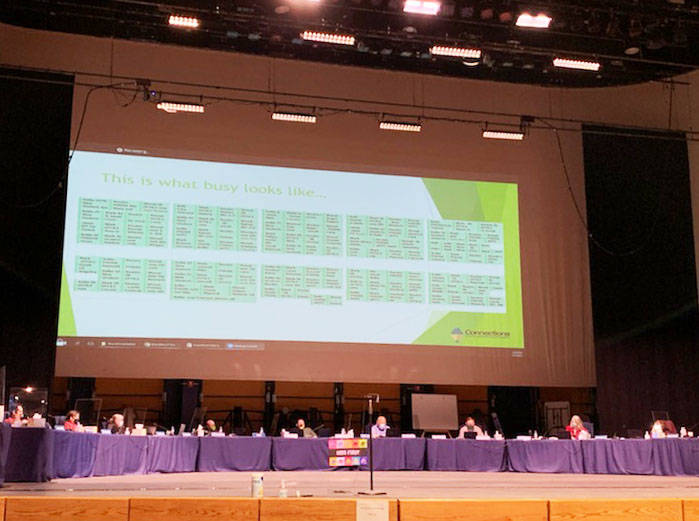The Kenai Peninsula Borough School District Board of Education will continue to offer health care coverage for board members after an effort to eliminate the coverage failed in committee.
The effort to phase out health care benefits for board members has been spearheaded by board member Matthew Morse, who said Monday he has wanted to phase out the benefits for board members since he was elected to the board in 2018.
Members of the KPBSD Board of Education receive a monthly stipend of $300 in addition to being eligible for district insurance. The KPBSD Board of Education president receives a monthly stipend of $400.
KPBSD Assistant Superintendent Dave Jones said Monday that three of the nine board members currently receive health insurance benefits through the district.
The action proposed by Morse would allow those three members currently receiving district insurance to continue receiving benefits, but would prevent newly elected members from being able to.
Morse said Monday that he doesn’t have a problem with the stipend afforded to board members and the board president, but that while campaigning he heard from several members of the community who took issue with how board members are compensated.
A survey conducted among Alaska school boards for the 2019-2020 school year found that the Kenai Peninsula Borough School District contributes roughly $21,367 per year to board members’ insurance.
Supplemental documentation submitted by Jones to the board shows that compensation for board members, however, is less than compensation for district employees. District employees also receive annual raises through STEP increases.
That document compares the annual number of days custodians work — 206, to the number of days student nutrition services employees work — 177, to the number board members work — 260. Though the board meets regularly once a month, Jones said the 260-day figures factors in the work board members do outside of their regular meetings, such as attending site council and assembly meetings and being the point of contact for people in their community who have an issue they want to talk about.
Board Vice President Debbie Cary, who said she spends a lot of time working “behind the scenes,” said during the April 5 Finance Committee meeting that she would also vote against moving the issue forward.
“We do have the option of opting out,” Cary said.
Board President Zen Kelly said during the same meeting that he would also not vote to phase out health care benefits for board members because the benefit is a good tool to help recruit new board members, helps keep board members more invested in the work they do for the district and is made optional for members.
“I don’t apologize for my stipend,” Kelly said. “It costs me a lot more from my everyday business job in dealing with board work and I’m very happy to do it, but this is a benefit that is allowed to the board and it has historically been so. I don’t see anything wrong with it. I strongly encourage that we keep this as a benefit for board members.”
In response to the recruitment argument, Morse said that if people are only interested in running for a board seat for the incentives, then they are probably not the best person for the job. Morse said that in running for a seat on the board, he viewed it as a community service opportunity as opposed to one through which he was seeking compensation or benefits.
Morse said Monday that he takes particular issue with the fact that board members qualify for district insurance when some district employees do not. In order to qualify for insurance, district employees must work at least 30 hours per week. That means some workers, such as custodians and school nutrition service staff, do not qualify.
“To me it’s a matter of right and wrong,” Morse said.
Jones, however, said that though meetings of the school board typically occur one per month, many of the board members put in hours outside of those meetings that the district attempts to compensate them for.
Jones also said that compensation for KPBSD board members is “on the lower side” of what board members in other districts receive. Board members in the Anchorage School District, for example, make more than $1,700 per month, according to a statewide survey conducted for the 2019-2020 school year.
Among 32 Alaska school districts who responded to a survey of school board compensation, 11 provide board members access to district health insurance. Board members in seven districts are not compensated at all, with monthly payment amounts per member ranging from $25 per month in Craig and Skagway districts to more than $1,700 in Anchorage and $1,500 in the Lower Yukon. According to survey data, board members in the Southeast Island district are usually compensated $100 per month, but elected to waive their compensation this year due to budget constraints. Members in seven other Alaska school districts receive a higher monthly compensation than those in the KPBSD, according to the survey.
The board ultimately voted during their April 5 finance committee meeting to not move forward with the plan to phase out health insurance.
Reach reporter Ashlyn O’Hara at ashlyn.ohara@peninsulaclarion.com.

